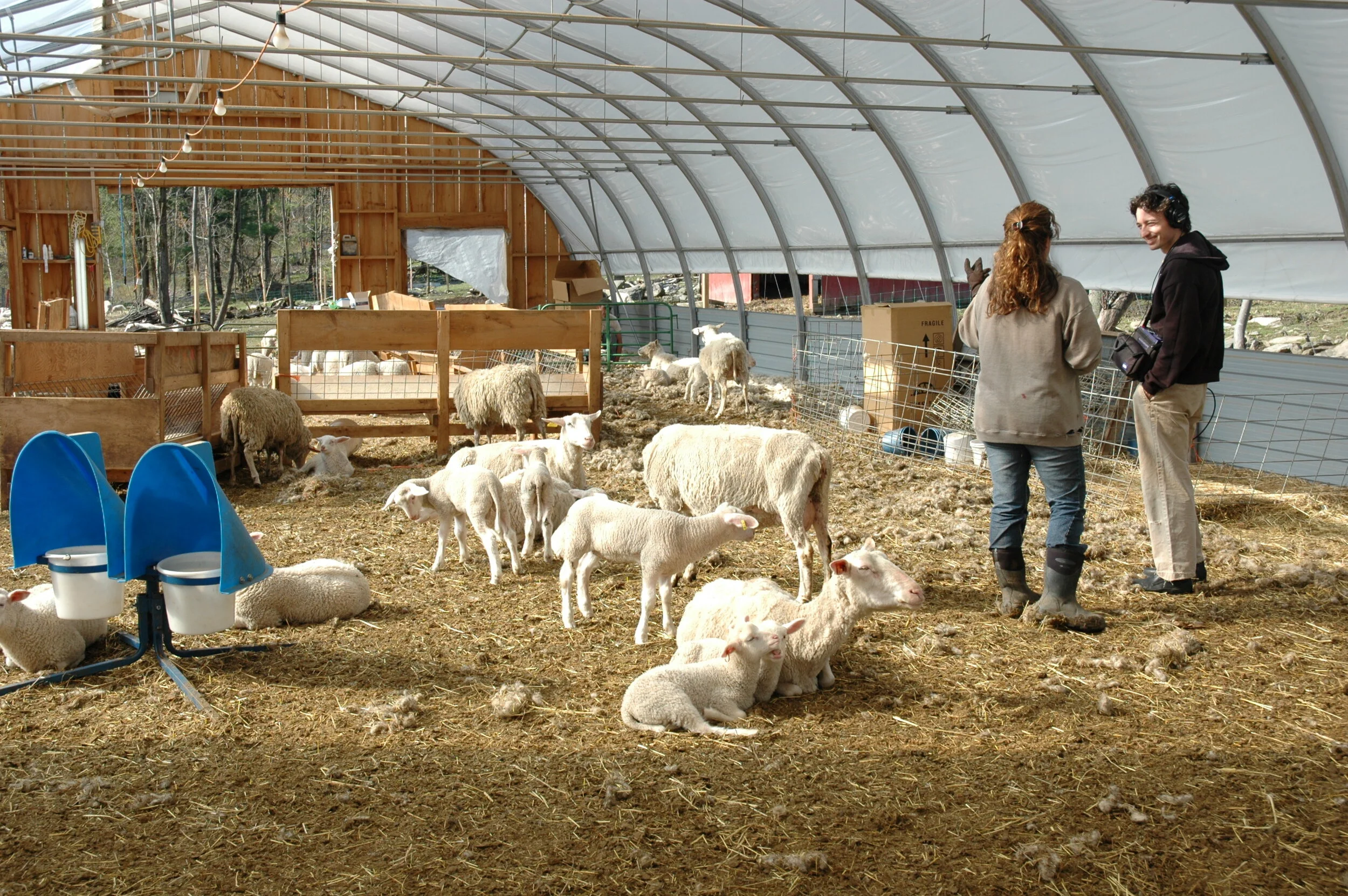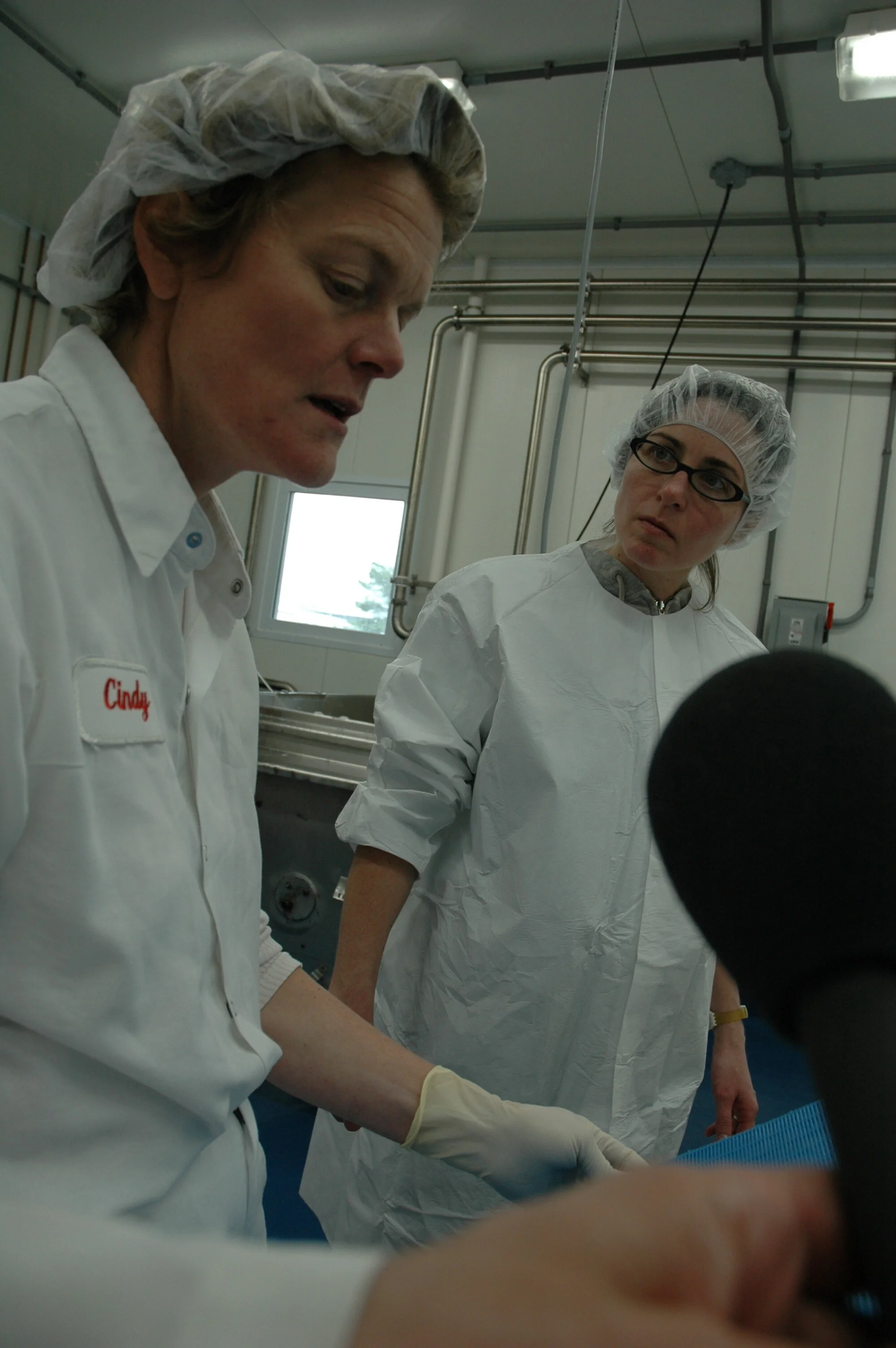Willow Hill Farm: Vermont
May 2006
Name: Willow Hill Farm [Update: Willow Hill Farm no longer makes & sells cheese. They have transitioned to a you-pick blueberry farm–something they always offered in addition to their farmstead cheesemaking.]
Owners: David Phinney and Willow Smart
Location: Milton, Vermont
Animals: 80-90 sheep (plus 80+ lambs) East Friesian and Icelandic Friesian crosses, 6 cows Dutch Belted and Brown
Swiss
Cheeses/Products: Sheep milk yogurt, Alderbrook, Autumn Oak, Blue Moon, Cobble Hill, Fernwood, La Fleurie, Mountain Tomme, Summertomme, Vermont Brebis, whole grass-fed lamb, wool blankets
David and Willow have truly rolled with the changes since they purchased their land in the early 90s. Beginning as an in-ground fruits and vegetable crop operation, they now have their feet firmly planted in the shepherding and cheesemaking business. A few vestiges of their old life remain- the single rectangular plot of Christmas trees now serving as a windbreak for pastures, the last of the beef cattle that will go this year, and even a couple retired chicken coops remain near the barn. Some pieces of these earlier businesses have been consistent: they have a booming, seasonal business with their organic blueberries and currants which they open up each summer for people to pick on their own and also sell at local farmer’s markets.
The big thing happening these days at Willow Hill Farm is the final construction on their new production facility. David and Willow took us on a tour of the new facility as well as the old to give us a sense of the main goal for the new building: increased efficiency. They will absolutely achieve this and they will continue to work their tails off.
David will be milking a minimum of 80 sheep and at least 5 cows while Willow will crank out over 15,000 pounds of cheese (she supplements her sheep’s milk with milk from Bonnieview Farm). Oh, and let’s not forget that David is also producing the delectable sheep’s milk yogurt and that Willow has to age, package, and take her cheeses and their organic blueberries and currants to market each week. Think about this for twenty seconds and you can understand why these two would strive for efficiency.
We were fortunate to visit post-lambing yet pre-milking (unlike cows and goats, sheep aren’t weaned from their mother’s milk for 30 days or so). The milking and cheesemaking will begin later than usual this year
because of the new production facility construction. The production facility is built on tiered levels, like steps, to allow the milk to be brought into the make room using gravity feed rather than pumps. Along the side of the make room are large windows to allow visitors to see the process and after the cheese is made, aging and brining rooms are the final stop before shipping. To get some relaxed moments with a shepherd or cheesemaker is a rare privilege; our visit with Willow and David was like a goldmine. After arriving and taking a tour of the new make room being constructed, we hovered over them as they did chores around the solar ban used for lambing season. The next morning we followed them around for chores again, watching as David tagged some lambs born only days ago. Then we went to see the old cheese production facility and meet the cows in the original barn.
One thing that stuck with us after spending two days with them was the level of commitment to their farm’s philosophy- it is truly inspiring. Regardless of the additional work (and sometimes cost) associated with the tenets they believe in, they do things the way they believe they should be done. David and Willow are believers in the true roots of the organic movement- meaning sustainable land management. They follow organic practices in their pastures and continue to feed their animals organic grain even though they recently de-certified their cheeses because they are supplementing their cow milk with milk from a neighboring dairy that is not organic. They could have asked their neighbor to convert to organic, or they could have searched for an organic milk source outside of their local area. It was too much, in their minds, to ask another farmer to convert to their philosophy and yet, remaining true to their own beliefs they continue with organic practices on their farm.
Animal comfort is also a high priority on the farm. When David explains why he doesn’t dock tails on his sheep, you can see that he considers the experience of the animal, the tail is the only defense that the animals have against biting black and horse flies that are around all summer long while they are on pasture. He didn’t have any assistants until recent years and when he mentions that he didn’t have a day off from milking for 8 years there is no bitterness in the statement, in his mind I think he just sees it as what has to be done for the animals and their operation.
Proper care for the animals and the land results in clean milk with wonderful nuances in flavor and this makes beautiful cheese. Willow will continue to produce both pasteurized, soft-ripened cheeses that are aged for only a couple weeks and also raw milk cheeses held for 60 days or more. She is cautious about her excitement for working in the new facility, as she knows, from years of experience, that any small change can impact the finished product.
We have total confidence that she will rock these changes as she and David have all the ones that have come before.







